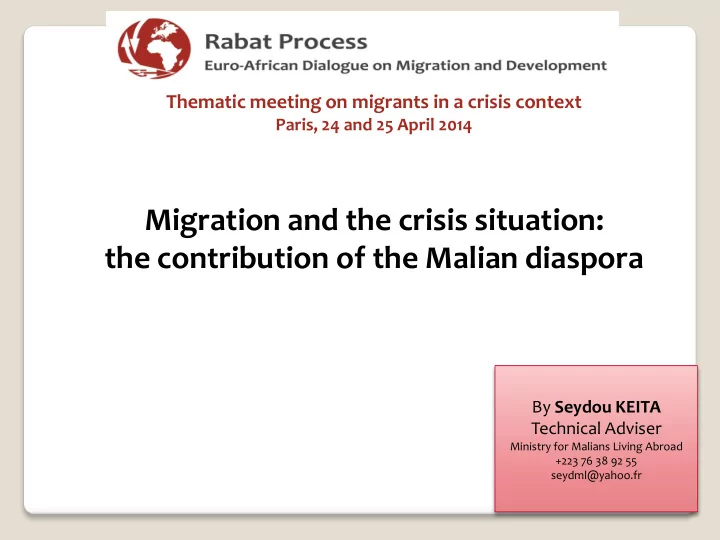

Thematic meeting on migrants in a crisis context Paris, 24 and 25 April 2014 Migration and the crisis situation: the contribution of the Malian diaspora By Seydou KEITA Technical Adviser Ministry for Malians Living Abroad +223 76 38 92 55 seydml@yahoo.fr
1. INTRODUCTION Once considered a model of democracy in Africa, since 17 January 2012 Mali has been facing the most serious crisis of its existence in the wake of attacks, followed by the occupation of two thirds (2/3) of its territory by terrorist groups (AQMI, MUJAO, MNLA, Ançar Eddine, Boko Haram...). The conjunction of the events of 21 and 22 March, which generated a breakdown of the normal constitutional order (a coup took place), and the action of armed groups in the north of the country resulted in around a thousand displaced people from the north to the south of the country , moving in the direction of neighbouring countries (mainly Algeria, Burkina Faso, Mauritania and Niger).
2. SCOPE OF MIGRATORY MOVEMENTS FOLLOWING THE CRISIS Estimate at May 2013: - Internally displaced persons throughout Mali: 301,027 - Refugees: Burkina Faso ( 49,975 ), Algeria ( 1,500 ), Mauritania ( 74,108 ) Niger ( 50,000 ).
A total of 175,583 refugees, according to UNHCR. Around 476,610 people were uprooted from their location of origin following the war. Different socio-economic groups that make up the populations of Northern Mali have been affected by these displacements. The most vulnerable groups – women and children – comprise three quarters (3/4) of displaced persons.
3. THE CONTRIBUTION OF THE MALIAN DIASPORA TO A RESOLUTION OF THE CRISIS Each time a crisis of some sort breaks out in Mali, members of the Malian diaspora contribute with material and financial resources, as well as offering moral and intellectual support. Financial contributions: Since the locust crisis of 2004, an environmental crisis that severely affected the Sahel regions with the threat of famine throughout the country, the Malian diaspora mobilised by making a contribution of 140 million CFA francs , or approx. 214,000 euros .
Since the crisis erupted in January 2012, members of the Malian diaspora in 27 countries in the world [1] made a contribution to the populations in the occupied northern areas and to internally displaced persons of: 206,682,200 CFA francs, or 315,000 euros. Apart from this contribution, their financial share in the war effort rose on 10 June 2013 to 628,822,768 CFA francs , or approx. 958,635 euros . This raises the total contribution of members of the Malian diaspora to 835,504,968 CFA francs , or 1,273,719 euros . The diaspora also sent donations in kind (food, clothing etc.) [1] Africa: 17; America: 2; Asia: 2; Arabian Gulf: 2; Europe: 4 (27 countries in total).
Moral and intellectual support During the difficult moments of the crisis, the Malian diaspora developed a patriotic momentum to oppose the partition of the country. The diaspora benefits from significant social capital in its host countries. This social capital was mobilised on 22 May 2012 before the European Parliament in response to lobbies supporting the secessional armed groups.
Institutional mechanism The Malian diaspora is very well structured in the host countries. It is represented in 64 countries throughout the world and each one of these countries accommodates a Council for Malians Living Abroad ( CME ), which represents different associations. The High Council for Malians Living Abroad (HCME) is an umbrella organisation recognised by the Malian government, which coordinates, with the support of the ministerial departments involved, the transport of emergency humanitarian aid from the diaspora to the beneficiaries. This organisation is authorised to facilitate the diaspora ´ s mobilisation of aid.
OUTLINE OF THE INSTITUTIONAL MECHANISM MALIAN DIASPORA GOVERNMENT Ministry for Ministry of Malians Living High the broad Council for Council for Economy, Malians Malians Finance and Ministry for Living Living Budget Humanitarian Abroad Abroad (Special Action account) BENEFICIARIES
CONCLUSION The Sahel countries, including Mali, experience poverty, recurrent political instability, a lack of good governance and a virtually permanent environmental crisis. All of these factors are the ingredients that determine massive forced displacements of populations already weakened by difficult socio-economic conditions. Domestic capabilities are quickly exceeded when crises occur. Disaster management always presents serious problems. We propose moving in a spirit of anticipation, by developing migration management strategies in a period of crisis. The context demands this approach. It is therefore necessary to establish policies that allow us to leverage national solidarity together with international efforts to curb migration crises, if not to prevent them.
THANK YOU!
Recommend
More recommend